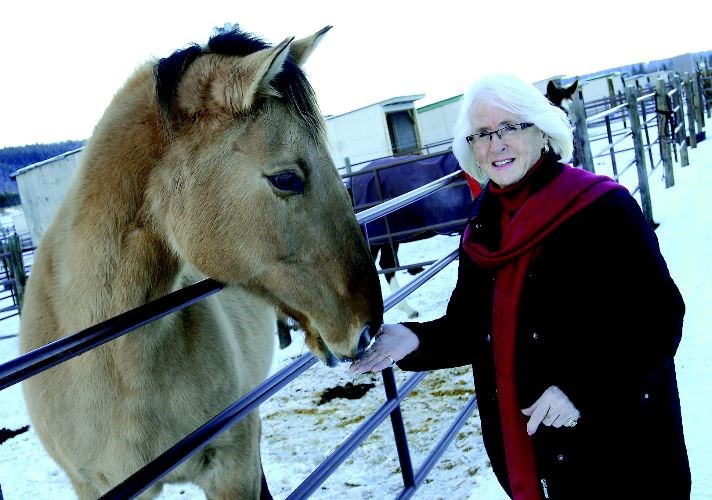Sixty-five years is a long time.
For Shirley Gratton, it's worthy of a lifetime membership in the B.C. Northern Exhibition, formerly known as the Prince George Exhibition.
"That is a few years, and it is an honour to receive that award and to be remembered," said Gratton.
Gratton's 65-year PGX affiliation began in 1947, when 12-year-old Shirley Campbell entered her first chicken in the annual fair when it was known as the Prince George Fall Fair.
Growing up with her brothers Darryl and Allan and sister Betty on the Campbell farm north of Prince George, tending horses and Rock Island Red chickens were on the kids' list of choirs. That first year, area residents started the Salmon River 4-H Club, set up as a youth organization to teach kids and young adults practical hands-on skills geared toward agricultural industries.
'My parents belonged to the [Salmon River] Farmers Institute and it was a place where they socialized and had meetings and they'd get their stumping powder and barbed wire for fencing and binder twine for the bailer," said Gratton, who received her lifetime membership in November.
"They decided we should have a 4-H club because every farmers institute sponsored a 4-H. We entered chickens and my mother would enter canning and her garden things. My mom won some stuff and I entered from then on."
Gratton loved art and brought her work from school in the exhibition grounds. She kept entering her handiwork in her adult years and her daughters Terri Lee and Shirli Gene followed suit, taking their rabbits to the fair for judging. Now Shirley's nine grandchildren and seven great-grandchildren are fair regulars.
"It's a family tradition," said Gratton. "The little kids are so proud to show off what they put in and if they win a ribbon, it's extra special."
Gratton, a former PGX director for seven years, has long been a community advocate, known for her fundraising efforts with the Salmon River Farmers' Institute hall, Hart Pioneer Centre Association, Prince George Hydro Power Pioneers, Huble Homestead and the Giscome Portage Society. She's a founding member of the Prince George Spinners and Weavers' Guild and is also a published author who wrote Saga of a Pioneer's Dream, a collection of Salmon Valley stories.
The PGX celebrated its 100th year in August, and has begun a new era under the new name, B.C. Northern Exhibition, now run by the Prince George Agricultural and Historical Association. One thing that won't change is Gratton's commitment.
"Shirley has been a supporter of the exhibition ever since she started in the chicken class," said association president Nancy Loreth. "She has always been a great supporter of us and she's been an asset for us to have all those years. The camaraderie and community spirit are what makes the exhibition what it is and she's depicted that community spirit for many years."
In 1987, Gratton spearheaded a new award for the PGX, the District C Farmers' Institute Challenge Shield, which rewards a collective effort from each group to compete in a wide range of categories, including, crops, fruits, preserves, vegetables, flowers, baking, quilting, knitting, old farm equipment preservation, and blacksmithing.
"The Salmon River Farmers' Institute sponsored the District C Challenge Shield for the other institutes to compete and keep our farming up front," said Gratton.
"It was a competition among the farmers institutes in our local area -- Pineview [Prince George], Mud River/Beaverly, Reid Lake, Salmon River, Eaglet Lake, and it's still is on today, 25 years later. And we won this year."
Gratton loves experimenting with jams, jellies and pickles and she always enters her canning delights in the fair. She knows lots of homemade goodies being made in Prince George kitchens but not many people think to enter them in the fair. With prizes at stake every year, she says its well worth it.
"If 100 people would enter two items in the fair, we would have the best fair in northern B.C.," she said. "It's the satisfaction to see if what you made is good. It makes Prince George a strong community and it makes you proud of where you live and what you do. People are proud of what they grow here, and if it wasn't for farming, our food wouldn't be what it is today."



